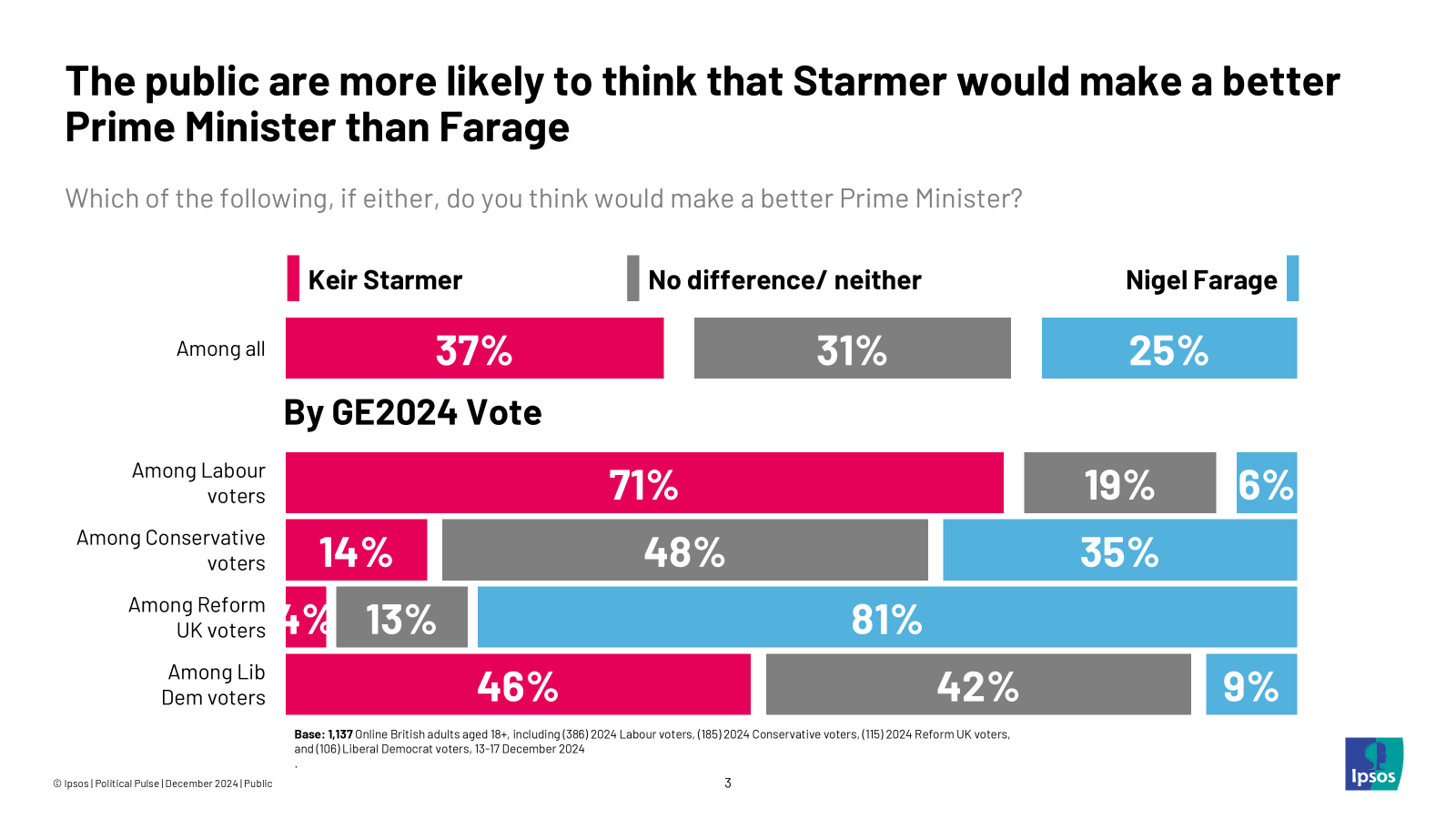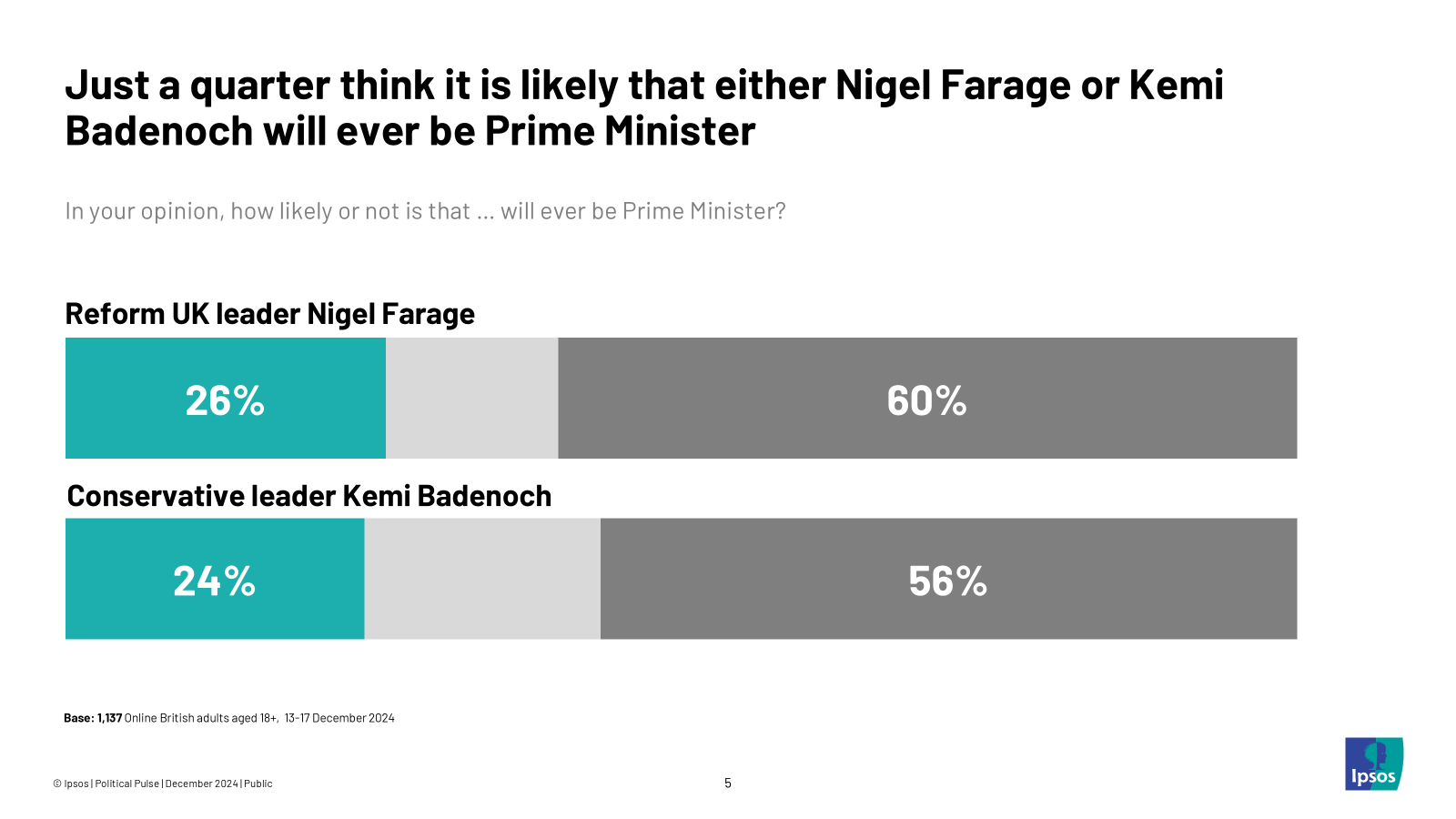Despite low approval ratings, public prefers Starmer as PM to Badenoch or Farage
A recent Ipsos Political Pulse survey indicates that the British public still favours Keir Starmer as Prime Minister over Kemi Badenoch or Nigel Farage. The poll, conducted online among 1,137 British adults aged 18+ from December 13-17, 2024, reveals that more people (although still only a minority overall) believe Starmer would make a better Prime Minister than either Badenoch or Farage.
- Starmer preferred over Badenoch: Consistent with last month, the public continue to think Keir Starmer (32%) would be a better Prime Minister than Kemi Badenoch (18%). Four in 10 say neither (27%) or no difference (14%).
- Starmer also preferred over Farage: More than 1 in 3 Britons believe Starmer (37%) would be a better Prime Minister than Farage, while 1 in 4 (25%) think the opposite. Three in 10 say neither (21%) or no difference (10%). Labour and Lib Dem GE2024 voters are more likely to favour Starmer, while Conservative and Reform UK GE2024 voters are more likely to favour Farage.

- Farage slightly preferred over Badenoch, but more choose neither: While a small margin favours Farage (23%) over Badenoch (16%) as a potential Prime Minister, in total half indicated that neither would be a good choice (40%), or that there would be no difference between the two (12%). In this context, 39% of 2024 Conservative voters prefer Kemi Badenoch, but 76% of Reform voters prefer Nigel Farage.
- At this stage, the public believes there is only low likelihood of either Badenoch or Farage becoming PM: Only a quarter of those surveyed believe it is likely that either Nigel Farage (26%) or Kemi Badenoch (24%) will ever become Prime Minister. Public opinion on Badenoch's likelihood of becoming Prime Minister has decreased slightly since November (those who think it is unlikely have risen from 51% to 56%). The figures for Kemi Badenoch are similar to predictions for Keir Starmer in January 2022, when 28% thought it was likely he would ever become PM and 50% unlikely. It took until October 2022 before most thought the Labour leader would become Prime Minister.

Gideon Skinner, Senior Director of UK Politics at Ipsos said:
Keir Starmer’s public satisfaction ratings are some of the lowest we’ve seen for a new PM, but despite the end of the honeymoon this data shows that politics is also about the choice voters need to make. Britons are not very happy with the job Keir Starmer’s government is doing running the country, but even so he is seen as a safer pair of hands to be Prime Minister than either the leader of the Conservative party or Reform UK.
The data shows that both Kemi Badenoch and Nigel Farage still have work to do to convince most of the public that they are the best choice for Prime Minister, particularly outside their core support – and to persuade voters that they are likely to make it to No10 in any case. Though there are still signs they can look out for – Nigel Farage has the most enthusiastic base, but also has more critics among supporters of the other parties. Kemi Badenoch clearly still has to break through with the public although it’s also true that even after his first two years as Leader of the Opposition most people thought it was unlikely that Keir Starmer would become PM, which only changed later on in 2022. The Conservative leader then does have time to turn perceptions around, but she is starting with higher negative ratings than her Labour opponent did, and only lukewarm support from her own base.
Notes to Editors:
- For media queries, please contact MacKenzie Horn at [email protected]
- Ipsos interviewed a representative sample of 1,137 adults aged 18+ across Great Britain. Interviews were conducted online between the 13th-17th December 2024.
- Data are weighted to match the profile of the population. All polls are subject to a wide range of potential sources of error.






